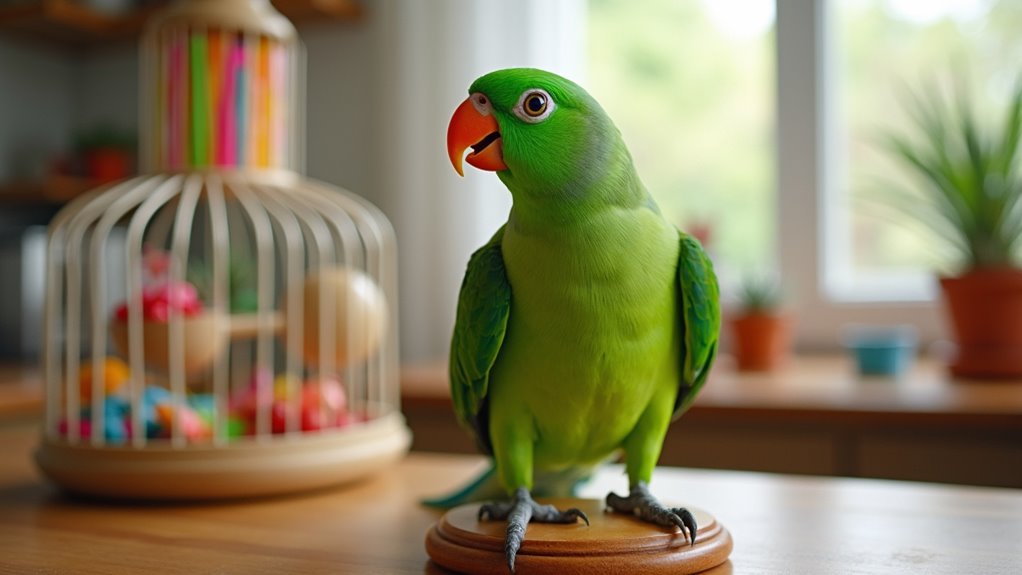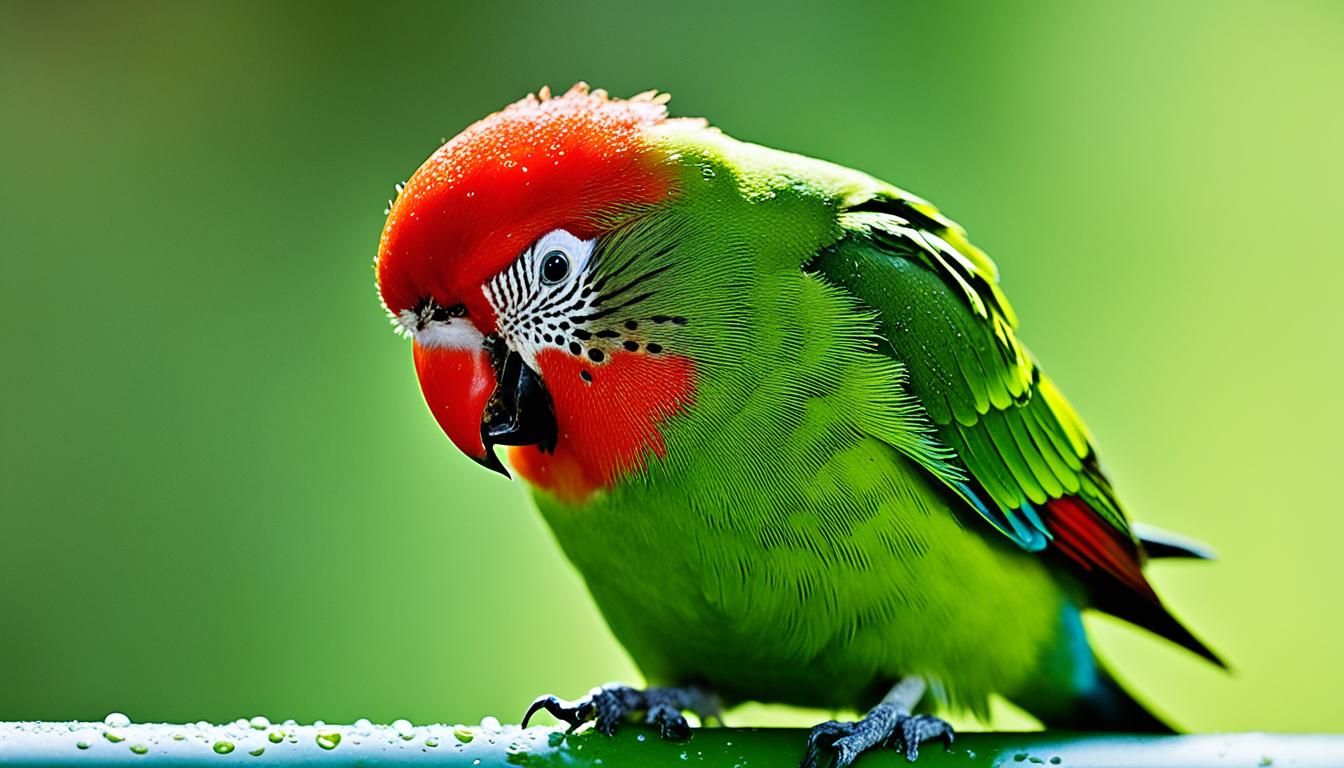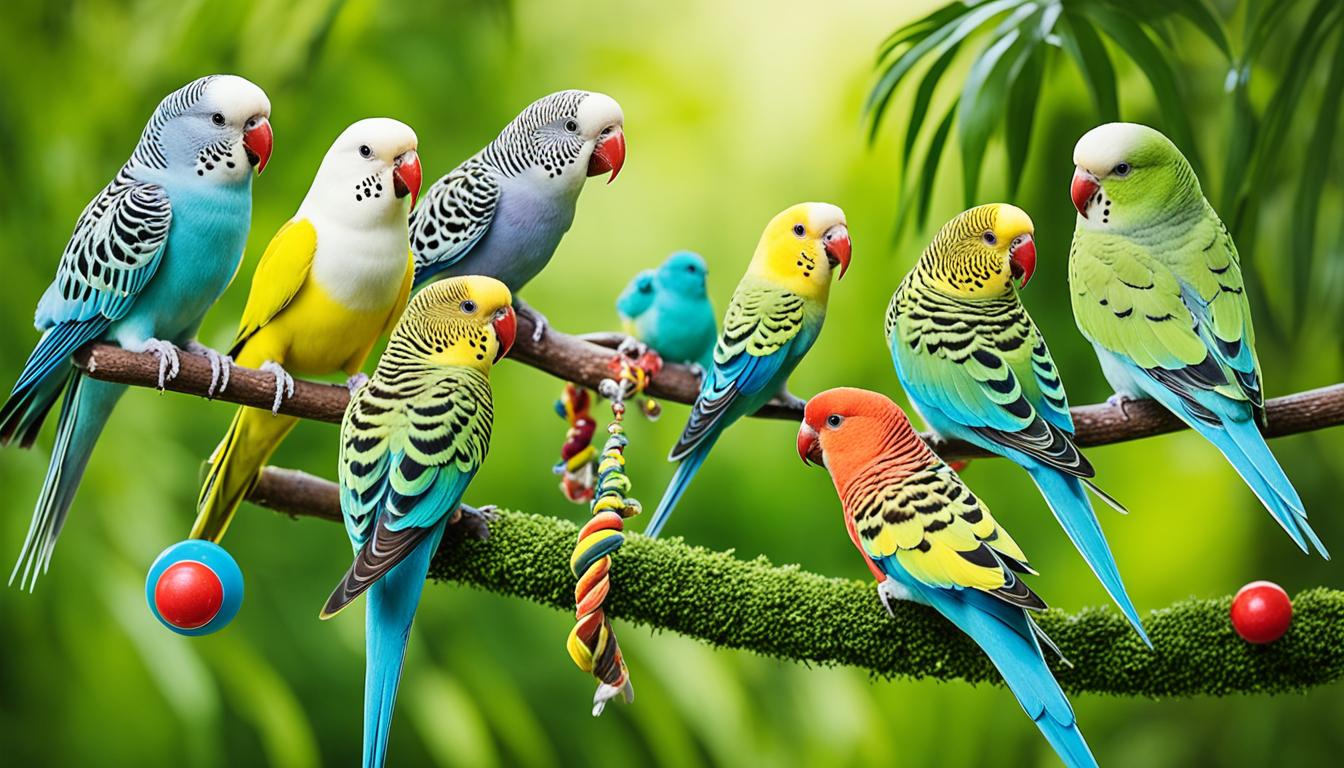To teach your bird to talk, establish a patient, consistent routine with frequent social interactions. Use positive reinforcement like praise and treats when your bird attempts to mimic words. Keep your voice clear and words simple, repeating them regularly. Engage naturally by chatting about daily activities and pointing to objects while saying their names. Every bird is unique and learns at its own pace, but with persistence, you’ll see progress. Keep exploring to discover more effective strategies.
Key Takeaways
- Be patient and consistent with daily, repetitive practice to reinforce vocabulary.
- Engage your parrot in social interactions using clear, simple words and phrases.
- Use positive reinforcement like praise and treats to encourage imitation.
- Incorporate visual cues and associate words with objects or actions for better understanding.
- Recognize individual differences; progress varies, so maintain a calm, encouraging environment.

If you want your bird to talk, patience and consistent training are essential. Teaching a parrot to speak isn’t an overnight process, but with the right approach, you’ll see progress. The foundation of successful speech development lies in understanding how your bird learns words and how fundamental social interaction is to that process. When you engage your bird regularly, it becomes more comfortable mimicking sounds and words. This continual exposure helps with vocabulary development, allowing your bird to recognize and reproduce specific words or phrases over time.
Start by choosing simple, clear words or phrases that are meaningful or frequently used around your home. Repetition is key. Say the word slowly and distinctly, and then encourage your bird to repeat it back. Use positive reinforcement—praise, treats, or affection—whenever your bird makes a sound close to what you’re trying to teach. Consistency is vital; the more often you practice, the better your bird will associate words with their meanings. Remember, patience is crucial. Some parrots pick up words quickly, while others need more time and gentle encouragement. Avoid getting frustrated or rushing the process, as stress can hinder learning.
Social interaction plays a significant role in your bird’s speech development. Parrots are social creatures that thrive on interaction, so they’re more likely to mimic words when they feel engaged and comfortable. Spend quality time talking to your bird daily, using a calm, friendly tone. This constant exposure not only helps with vocabulary development but also strengthens your bond. When your bird feels safe and valued, it’s more inclined to imitate sounds and words as a form of social bonding. Incorporate talking into your daily routines—say good morning, tell your bird what you’re doing, or narrate activities around the house. These frequent, natural interactions create a rich auditory environment that encourages speech.
Additionally, it’s helpful to use visual cues alongside words. Point to objects or perform actions while saying related words. This association reinforces understanding and makes it easier for your bird to grasp the meaning behind the words. Remember, every bird is unique; some may start speaking within a few months, while others may take a year or longer. Be consistent, patient, and positive. With time and persistent social interaction, you’ll notice your bird gradually building its vocabulary and possibly even engaging in conversations, making your shared experience more rewarding.
Frequently Asked Questions
How Long Does It Typically Take for a Bird to Start Talking?
Most parrots start talking between 6 to 12 months, but age-related learning varies. During the early speech development stages, patience is key, as some birds may take longer. You might notice initial sounds or mimicking first words around 8 to 10 weeks, but full speech can take several months. Keep interacting consistently, and your bird will develop its talking skills at its own pace.
Can Older Birds Learn to Talk, or Only Young Ones?
Think of your bird as a wise old book, full of stories waiting to be told. Age-related learning doesn’t block speech; it may slow it, but memory capacity remains strong. Older birds can learn to talk, especially with patience and consistent training. Your bird’s age isn’t a barrier—it’s simply a different chapter. With encouragement, your mature companion can surprise you with new words, proving it’s never too late to learn.
Are Some Parrot Breeds Naturally Better Talkers Than Others?
Some parrot breeds are naturally better talkers than others because of their temperament and vocal abilities. For example, African Greys and Amazons tend to excel in vocal training techniques, making them more likely to develop impressive speech. Your success depends on understanding your bird’s temperament, staying consistent with vocal training techniques, and providing positive reinforcement. With patience and practice, even less talkative breeds can surprise you with their communication skills.
What Are Common Mistakes That Hinder a Bird’s Ability to Learn Words?
You might hinder your bird’s ability to learn words by keeping it isolated, which limits its social interactions and motivation to mimic sounds. Inconsistent training also hampers progress; if you don’t regularly reinforce words, your bird can get confused or lose interest. To improve, provide consistent, engaging sessions and avoid isolating your bird, ensuring it stays motivated and connected, which boosts its chances of learning to talk.
How Can I Tell if My Bird Is Interested in Learning to Talk?
You might worry your bird isn’t interested in learning to talk, but observing its bird vocalizations is key. If your bird responds to sounds, mimics your tone, or shows curiosity, it’s a good sign of interest. Remember, bird personality varies—some are more vocal and enthusiastic to learn. Engage with your bird regularly, and you’ll notice these signs, making the learning process more enjoyable for both of you.
Conclusion
Now that you’ve learned some key tips, your parrot is closer than ever to surprising you with its first words. But beware—every bird is unique, and the moment of that first meaningful chirp might come when you least expect it. Keep patient, stay consistent, and enjoy the journey. Before you know it, your feathered friend could be sharing secrets only you understand. Are you ready to discover what your bird has to say next?










